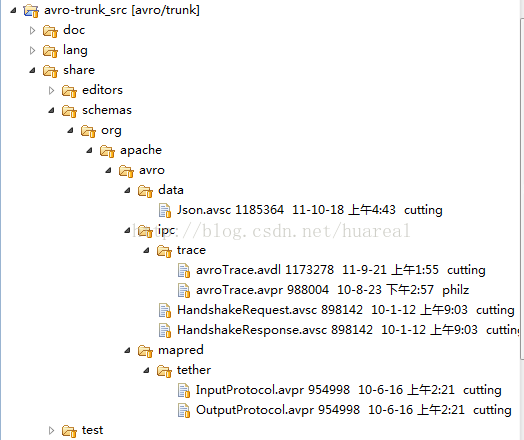大数据核心技术源码分析之-Avro篇
云计算可谓当红的发紫,而作为云计算的领头羊Hadoop的生态圈,日益增大,都知道未来的海量数据时代,掌握了制高点,就等于掌握了核心和命脉;
童鞋们,如果不了解云,如何还是,如果了解云,又该如何深入呢;
个人也是带着疑问,一步步走来,简单一个思路,看设计原理不难,搭建环境、准备Demo也不难;给出设计思路也不算很难;
但是对核心源码的分析和对设计思路的追奔溯源,需要更大的激情和毅力;
一句话,Hadoop志在必得,所以打点行囊,上路吧,从底层开始首先从Avro开始;
Apache Avro™ is a data serialization system
海量数据的核心就是无边的数据,而这些数据如果采用传统的OS模型的文件格式有何不妥呢;
为何Hadoop的HDFS需要依赖底层的Avro来完成呢?
先看看Avro的设计目标:
将数据结构或对象转化成--便于存储和传输的格式 【多个节点之前的数据存储和传输要求】
支持数据密集型应用,适合于大规模数据的存储和交换。
看看arvo的特性和功能:
1:丰富的数据结构类型
2:快速可压缩的二进制数据格式
3:存储持久数据的文件容器
4:远程过程调用(RPC)
5:简单的动态语言结合功能
arvo数据存储到文件中时,模式随着存储,这样保证任何程序都可以对文件进行处理。
模式为json格式
Java写入的,可以用C/C++读取
下载源码分析
对应源码部分有多种语言版本
记下了在另外一部分可以看到schema
首先看下data下的Json.avsc的schema格式
{"type": "record", "name": "Json", "namespace":"org.apache.avro.data",
"fields": [
{"name": "value",
"type": [
"long",
"double",
"string",
"boolean",
"null",
{"type": "array", "items": "Json"},
{"type": "map", "values": "Json"}
]
}
]
}
可以看下ipc和mapred下额schema
首先看下ipc的schema定义
1:handleshakerequest.avsc
{
"type": "record",
"name": "HandshakeRequest", "namespace":"org.apache.avro.ipc",
"fields": [
{"name": "clientHash",
"type": {"type": "fixed", "name": "MD5", "size": 16}},
{"name": "clientProtocol", "type": ["null", "string"]},
{"name": "serverHash", "type": "MD5"},
{"name": "meta", "type": ["null", {"type": "map", "values": "bytes"}]}
]
}
2:handleshakerespone.avsc
{
"type": "record",
"name": "HandshakeResponse", "namespace": "org.apache.avro.ipc",
"fields": [
{"name": "match",
"type": {"type": "enum", "name": "HandshakeMatch",
"symbols": ["BOTH", "CLIENT", "NONE"]}},
{"name": "serverProtocol",
"type": ["null", "string"]},
{"name": "serverHash",
"type": ["null", {"type": "fixed", "name": "MD5", "size": 16}]},
{"name": "meta",
"type": ["null", {"type": "map", "values": "bytes"}]}
]
}
3:avroTrace
{
"protocol" : "AvroTrace",
"namespace" : "org.apache.avro.ipc.trace",
"types" : [ {
"type" : "enum",
"name" : "SpanEvent",
"symbols" : [ "SERVER_RECV", "SERVER_SEND", "CLIENT_RECV", "CLIENT_SEND" ]
}, {
"type" : "fixed",
"name" : "ID",
"size" : 8
}, {
"type" : "record",
"name" : "TimestampedEvent",
"fields" : [ {
"name" : "timeStamp",
"type" : "long"
}, {
"name" : "event",
"type" : [ "SpanEvent", "string" ]
} ]
}, {
"type" : "record",
"name" : "Span",
"fields" : [ {
"name" : "traceID",
"type" : "ID"
}, {
"name" : "spanID",
"type" : "ID"
}, {
"name" : "parentSpanID",
"type" : [ "ID", "null" ]
}, {
"name" : "messageName",
"type" : "string"
}, {
"name" : "requestPayloadSize",
"type" : "long"
}, {
"name" : "responsePayloadSize",
"type" : "long"
}, {
"name" : "requestorHostname",
"type" : [ "string", "null" ]
}, {
"name" : "responderHostname",
"type" : [ "string", "null" ]
}, {
"name" : "events",
"type" : {
"type" : "array",
"items" : "TimestampedEvent"
}
}, {
"name" : "complete",
"type" : "boolean"
} ]
} ],
"messages" : {
"getAllSpans" : {
"request" : [ ],
"response" : {
"type" : "array",
"items" : "Span"
}
},
"getSpansInRange" : {
"request" : [ {
"name" : "start",
"type" : "long"
}, {
"name" : "end",
"type" : "long"
} ],
"response" : {
"type" : "array",
"items" : "Span"
}
}
}
}
mapred下的schema定义
1:inputProtocol.arsc
{"namespace":"org.apache.avro.mapred.tether",
"protocol": "InputProtocol",
"doc": "Transmit inputs to a map or reduce task sub-process.",
"types": [
{"name": "TaskType", "type": "enum", "symbols": ["MAP","REDUCE"]}
],
"messages": {
"configure": {
"doc": "Configure the task. Sent before any other message.",
"request": [
{"name": "taskType", "type": "TaskType",
"doc": "Whether this is a map or reduce task."},
{"name": "inSchema", "type": "string",
"doc": "The Avro schema for task input data."},
{"name": "outSchema", "type": "string",
"doc": "The Avro schema for task output data."}
],
"response": "null",
"one-way": true
},
"partitions": {
"doc": "Set the number of map output partitions.",
"request": [
{"name": "partitions", "type": "int",
"doc": "The number of map output partitions."}
],
"response": "null",
"one-way": true
},
"input": {
"doc": "Send a block of input data to a task.",
"request": [
{"name": "data", "type": "bytes",
"doc": "A sequence of instances of the declared schema."},
{"name": "count", "type": "long",
"default": 1,
"doc": "The number of instances in this block."}
],
"response": "null",
"one-way": true
},
"abort": {
"doc": "Called to abort the task.",
"request": [],
"response": "null",
"one-way": true
},
"complete": {
"doc": "Called when a task's input is complete.",
"request": [],
"response": "null",
"one-way": true
}
}
}
2:outputProtocal.avsc
{"namespace":"org.apache.avro.mapred.tether",
"protocol": "OutputProtocol",
"doc": "Transmit outputs from a map or reduce task to parent.",
"messages": {
"configure": {
"doc": "Configure task. Sent before any other message.",
"request": [
{"name": "port", "type": "int",
"doc": "The port to transmit inputs to this task on."}
],
"response": "null",
"one-way": true
},
"output": {
"doc": "Send an output datum.",
"request": [
{"name": "datum", "type": "bytes",
"doc": "A binary-encoded instance of the declared schema."}
],
"response": "null",
"one-way": true
},
"outputPartitioned": {
"doc": "Send map output datum explicitly naming its partition.",
"request": [
{"name": "partition", "type": "int",
"doc": "The map output partition for this datum."},
{"name": "datum", "type": "bytes",
"doc": "A binary-encoded instance of the declared schema."}
],
"response": "null",
"one-way": true
},
"status": {
"doc": "Update the task's status message. Also acts as keepalive.",
"request": [
{"name": "message", "type": "string",
"doc": "The new status message for the task."}
],
"response": "null",
"one-way": true
},
"count": {
"doc": "Increment a task/job counter.",
"request": [
{"name": "group", "type": "string",
"doc": "The name of the counter group."},
{"name": "name", "type": "string",
"doc": "The name of the counter to increment."},
{"name": "amount", "type": "long",
"doc": "The amount to incrment the counter."}
],
"response": "null",
"one-way": true
},
"fail": {
"doc": "Called by a failing task to abort.",
"request": [
{"name": "message", "type": "string",
"doc": "The reason for failure."}
],
"response": "null",
"one-way": true
},
"complete": {
"doc": "Called when a task's output has completed without error.",
"request": [],
"response": "null",
"one-way": true
}
}
}
从上面的基本Data的schema到IPC,以及mapred的schema;
可以说avro从文件传输领域提供了基础支撑,也许根据这些规则和思想,可以创造更多的东西;Drill的诞生也离不开Avro.
接下来进一步分析源码如何实现数据和模式的一起写入,以及在RPC和动态语言的支持特性......

